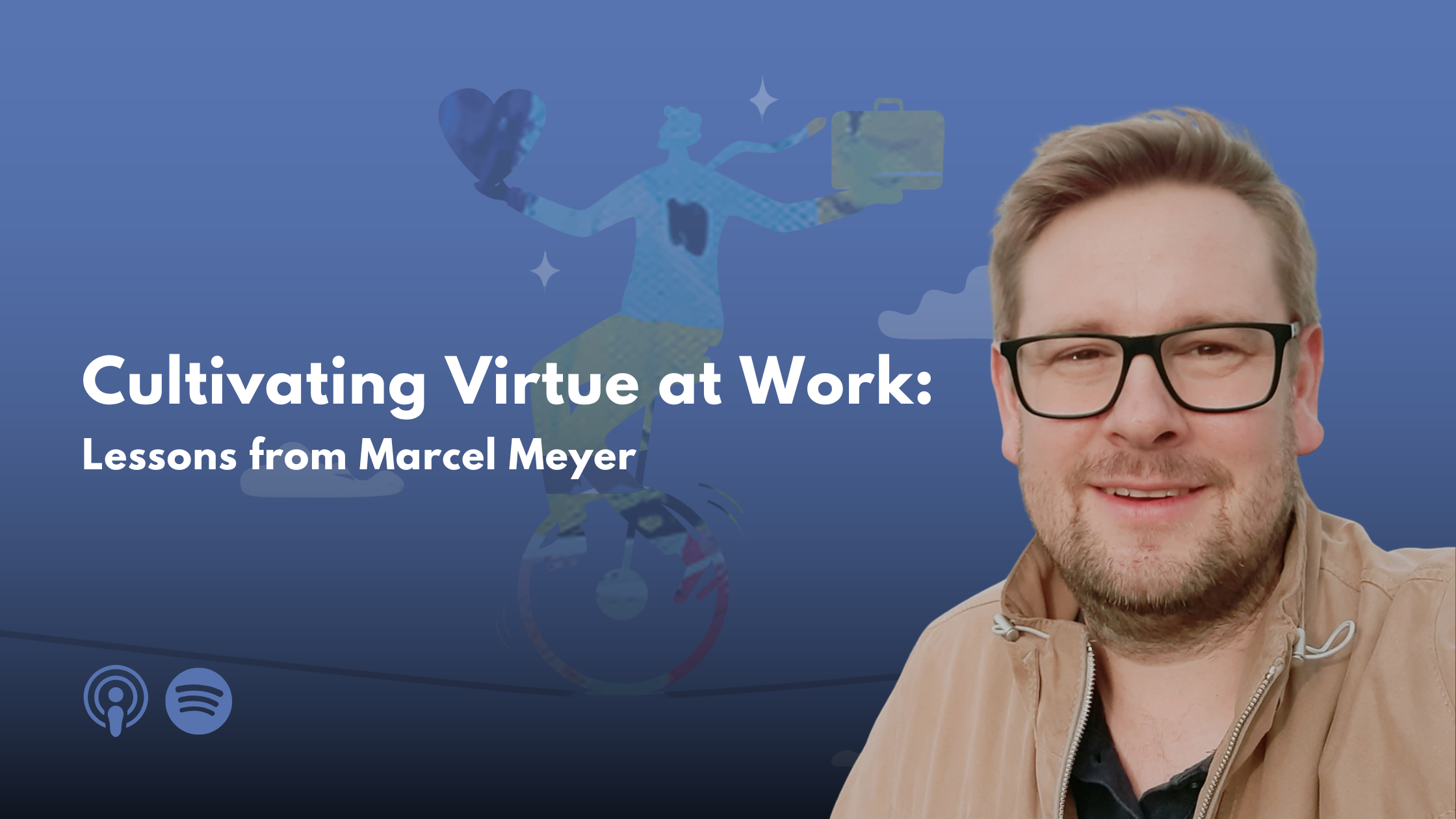On this episode of Meaningful Work Matters, Andrew speaks with Marcel Meyer, professor at the School of Economics and Business at the University of Navarra. Meyer specializes in ethical leadership, organizational behavior, and Aristotelian virtue ethics - an area of philosophy that explores how character, purpose, and moral wisdom help people and communities flourish.
In this conversation, Meyer and Soren examine how Aristotle’s ideas can help us rethink what it means to lead and thrive at work. They discuss why virtue is developed through action, how flourishing depends on community, and how leaders can use empathy, reason, and character to create more ethical and hopeful organizations.
Returning to Aristotle
Meyer begins the conversation by situating his work in the long lineage of Aristotelian thought. Aristotle, he explains, saw human beings as rational and social creatures who live in community and seek eudaimonia - a term often translated as “human flourishing.”
For Aristotle, eudaimonia is about living in alignment with virtue and purpose over time. “Virtue,” Meyer says, “means character excellence. It’s built through the actions we take, the habits we form, and the kind of person we become.”
He emphasizes that flourishing is not an end state, but a continual process of cultivating virtues like courage, justice, temperance, and practical wisdom (phronesis). This growth happens through practice, reflection, and connection with others - a theme that becomes central to the rest of the conversation.
The Moral and Relational Core of Flourishing
What makes flourishing not just a personal pursuit, but a moral one?
Meyer explains that eudaimonia is inherently social:
“Human beings are social creatures, and flourishing happens within relationships and communities, not in isolation.”
Our moral character, he continues, is formed and expressed through our roles and responsibilities in families, organizations, and society.
Aristotle’s ethics, then, offer a lens for thinking about work as participation in the common good. Flourishing requires integrity, responsibility, and self-governance, which together connect individual growth to the wellbeing of others.
From Individuals to Organizations
How does any of this apply to the modern workplace? Aristotle, after all, was certainly not thinking about that when he wrote about ethics.
Meyer points out that Aristotle’s notion of the *polis (*a self-governing city-state devoted to human flourishing) is not far removed from today’s large organizations. “The challenge,” he says, “is how to take individual virtue and bring it into the organization.”
That question aligns closely with the ideas explored in our special 50th episode, where Soren further examines how workplaces can serve as modern moral communities devoted to purpose and wellbeing.
Building on that connection, Meyer draws on Positive Organizational Scholarship (POS), a field pioneered by scholars like Kim Cameron, who has also appeared on this podcast. POS explores how organizations can amplify the good through processes, routines, and cultures that encourage ethical behavior, hope, and human connection.
Meyer connects these ideas to Aristotle’s cycle of action, habit, and character. Just as individuals become virtuous through repeated actions, organizations can cultivate virtuousness through systems that reinforce and reward goodness.
Leadership as Modern Rhetoric
The conversation then turns to Aristotle’s work on rhetoric, which Meyer links directly to leadership. Leadership, he says, is fundamentally a relational act of persuasion.
He unpacks Aristotle’s three pillars of persuasion:
Pathos, or emotion, reflects empathy and understanding.
Logos, or logic, provides reasoning and structure.
Ethos, or character, establishes credibility and trust.
“Persuasion,” Meyer notes, “is achieved by the speaker’s personal character, when the speech makes us think they are credible.” In other words, ethical leaders inspire through integrity as much as through their words.
Soren adds that if more leaders were trained to connect reason, emotion, and integrity, “we would live in a very different world.”
Meyer agrees, emphasizing that listening is one of the most overlooked yet essential leadership skills. Leaders who genuinely listen and seek the good of others, he says, are those who help organizations and people flourish together.
The Positive Leadership Action Framework
Meyer shares his Positive Leadership Action Framework. Developed from his research in virtue ethics and positive organizational scholarship, the model identifies five areas leaders can focus on to nurture ethical and flourishing cultures:
Create positive assumptions about the future. Cultivate hope and optimism grounded in reality, not wishful thinking.
Foster a positive formal environment. Build structures and policies that reinforce trust and fairness.
Support positive professional growth. Align development with both performance and purpose.
Nurture a positive informal environment. Strengthen relationships that sustain emotional wellbeing.
Model reflection and self-awareness. As Meyer puts it, “Work on the person in the mirror.”
He notes that this process is incremental.
“It’s like learning a language. You start small… asking yourself, could I have been more patient in this situation? More truthful? More kind? Over time, that’s how character grows.”
Key Takeaways
Virtue is cultivated through daily actions, habits, and reflection.
Flourishing is relational - it grows through communities and organizations.
Leadership is moral persuasion grounded in empathy, reason, and integrity.
Positive organizations amplify goodness through structures and relationships.
Self-reflection is the foundation of meaningful and ethical leadership.
Final Thoughts
Aristotle’s philosophy may be ancient, but Meyer shows it is remarkably relevant to the modern workplace.
His message is both timeless and practical: meaningful work starts with moral character, grows through community, and flourishes when leaders commit to the common good.



